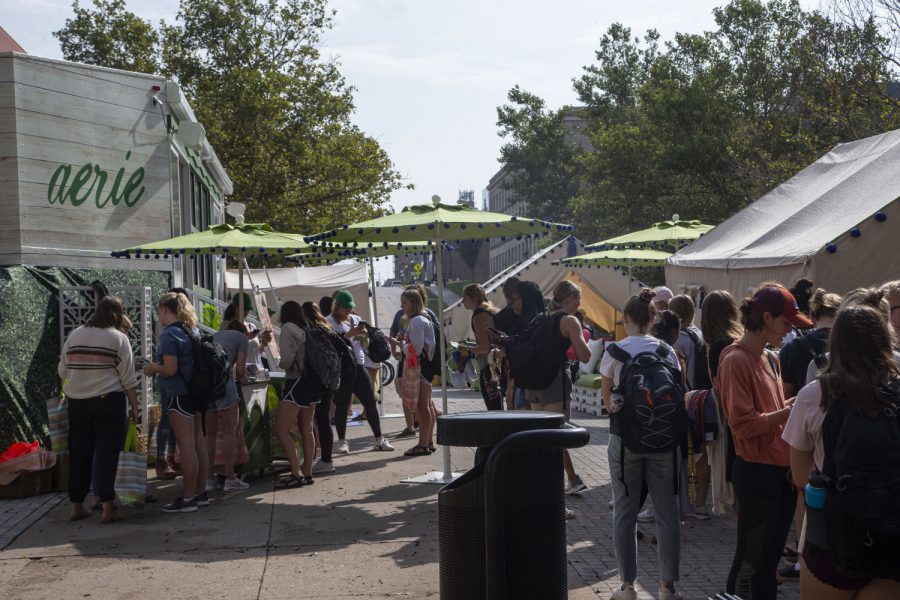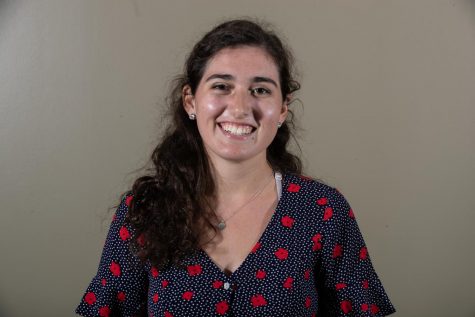Opinion: Pop-up shops on campus damage learning environment
Aerie setting up next to the Main Library is just the most recent example of inappropriate corporate behavior toward students.
Students stand in line by the Aeirie tents outside of the Adler Journalism building on Thursday, Sept. 12, 2019. Aeirie is a sub-brand of American Eagle. (Katie Goodale/The Daily Iowan)
September 13, 2019
Our educational experiences are marked by consumption. Whether that’s intellectual consumption performed within classrooms or the consumerist consumption performed right outside of them, campus is loaded with opportunities to perform capitalist roles.
Every few weeks — especially during the fall semester when the weather is nice and people haven’t yet gone winter-broke — I run into a new marketing effort on campus. On my way to class, I was deterred by a large Aerie pop-up shop situated in between the Main Library, the Adler Journalism Building, and the Communications Building. With “Power. Positivity. No Retouching” emblazoned on the largest of its three tents pitched outside the university buildings — set up like a Bonnaroo outpost — the pop-up was an unavoidable whirl of body-positivity and price-tags.
We are inundated with corporate interests the moment we step foot on campus. From dining-hall food to coffee to advertising, I remember my first few weeks here most distinctly through things. From the university-sponsored Target run to Victoria Secret scavenger hunts, capitalist and consumerist interests are unavoidable.
Companies hock their product in exchange for a free coffee, a water bottle, a pin — anything to keep their names alive in this distinctly educational, student-inhabited space.
There is not anything inherently wrong with advertising or marketing to target audiences; college campuses provide the perfect platform to reach a captive, interested market. But the line between consumer and student environments is dangerously easy to cross, and what happens when we destroy the idea of impartial, unadvertised spaces?
We are already completely consumed by marketing. Instagram targets our conversations to find the perfect ad while native advertising masquerades itself as a reputable article. The marketing era is all-encompassing digitally, but physical spaces without its effects should still exist. The university theoretically provides the ideal space for impartial space. Campus should be devoted to student’s education and livelihoods, not promoting the newest GoPuff deal. It may be possible to shop 10 yards from the library, but why should we?
Capitalism denies us a space to exist in a nonconsumerist mindset. Even in pursuit of education, companies find a way to infiltrate and spread their branding. Except now, their branding relies on an emotional crutch that to shop here means to embrace something new and previously unheard of. If we buy from Aerie on campus, we’re not just buying bras; we’re supposedly supporting body positivity on campus. We’re doing a service to our classmates — or so we’re led to believe. At the end of the day, there’s little to no difference in the ethics of consumption here or elsewhere.
American Eagle is the parent company of Aerie, and its ethical practices are murky at best. While they have claimed to support sustainability and workers’ rights, there is little to no evidence that the company has taken any steps toward its goal. American Eagle publicly committed to reducing its emissions by 20 percent by the end of 2017, but there are no real measures for their success. Similarly, they claim to support workers’ rights, but no evidence exists to confirm whether or not the company pays its workers a living wage.
At the end of the day, pop-ups or marketing efforts on campus don’t really change anything. They’re not inherently toxic or dangerous examples of capitalism; no real harm comes to anyone, except for maybe being duped into spending $40 on a bra.
It sets a concerning principle for what is and what isn’t a commercial space. When I’m trying to go to class, I don’t want to be considered as a potential customer, and I shouldn’t have to. There are appropriate times to be a consumer, and the hour block between my biology lecture and my English discussion shouldn’t be one.















